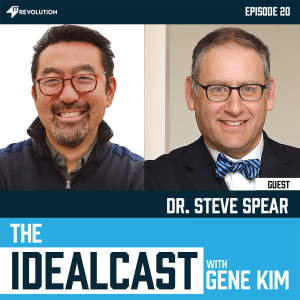Episodes

Wednesday Aug 04, 2021
Wednesday Aug 04, 2021
In this episode of The Idealcast, Gene Kim speaks with Dr. Steven Spear on his critiques of several articles from the NY Times and the Wall Street Journal, and their characterization of the impact of Just-in-Time (JIT) supply chains and the widespread shortages caused by the COVID-19 global pandemic. While the unprecedented health crisis created a widespread shortage of almost everything—from toilet paper to semiconductor chips to raw materials vital for medical materials—with results that impacted everyday life on a global scale, Dr. Spear makes the claim that JIT lessened the severity of shortages, as opposed to causing them.
The discussion is informed by Spear’s work on accelerating learning dynamics within organizations and the Toyota Production System, and from his time observing and working directly with a tier-one Toyota supplier. Kim and Spear dive deep into supply chain dynamics and why they are important to society. The discussion delves into how JIT manufacturing not only revolutionized manufacturing but also the entire manufacturing supply chain and how it increased (not decreased) resilience, productivity, efficiency, and prosperity.
They also explore the structure and dynamics of these JIT supply chains, as well as the similarities of the famous Netflix Chaos Monkey, famous for helping Netflix build resilient services that can survive even widespread cloud outages and the larger, emerging field of Chaos Engineers (arguably, a subset of resilience engineering).
Additionally, they explore Toyota’s manufacturing and how its history helped it become one of the least impacted by the semiconductor shortages. They follow that with an examination of the JIT’s antithesis and how it’s similar to the dynamics found in the Soviet’s centrally planned economy, particularly with its IT structure and dynamic results. Kim and Spear tie these things into the three basic tools of finance: net present value, option theory, and portfolio diversification.
ABOUT THE GUESTS
Dr. Steve Spear (DBA MS MS) is principal for HVE LLC, the award-winning author of The High-Velocity Edge, and patent holder for the See to Solve Real Time Alert System. A Senior Lecturer at MIT’s Sloan School and a Senior Fellow at the Institute, Dr. Spear’s work focuses on accelerating learning dynamics within organizations so that they know better and faster what to do and how to do it. This has been informed and tested in practice in multiple industries including heavy industry, high tech design, biopharm R&D, healthcare delivery and other social services, US Army rapid equipping, and US Navy readiness.
YOU’LL LEARN ABOUT
- What are supply chains, why they’re so vast and complex, and why they are important to society
- How Just-in-Time (JIT) manufacturing revolutionize manufacturing, the entire manufacturing supply chain, and the supply chain for basically everything
- How JIT increased, not deceased, the resilience of the supply chain
- Why Toyota is one of the auto manufacturers least impacted by the semiconductor shortages, partially as a result of what they learned during the Fukushima earthquake and tsunami in 2011
- How the structure and dynamics of the Toyota supply chain are almost exactly the same as the structure and dynamics of great systems discussed in previous episodes, such as the COVID mass vaccination clinic with Trent Green and Team of Teams
- How Toyota has the ability to reconfigure themselves with a low cost of change
- How these principles are very similar to Netflix chaos monkey and the entire field of what is now called chaos engineering
- How the antithesis of JIT is similar to the dynamics found in the Soviet’s centrally planned economy, particularly with its IT structure and results in dynamics
- How inventory is a substitute for knowledge
- How this all ties into the three basic tools of finance: net present value, option theory, and portfolio diversification
RESOURCES
- Announcing New Book from Gene Kim and Dr. Steven J. Spear
- NPR: Plastic Is The New Toilet Paper For Scientists
- New York Times: Shopping for Fashion, Six Months On
- Planet Money: Negative Oil
- New York Times: How the World Ran Out of Everything
- New York Times: ‘I’ve Never Seen Anything Like This’: Chaos Strikes Global Shipping
- Wall Street Journal: Auto Makers Retreat From 50 Years of ‘Just in Time’ Manufacturing
- The Mainframe DevOps Team Saves the Day at Walmart
- Frontline: Always Low Prices
- “The Beer Game” by Prof. John D. Sterman
- Lean manufacturing
- Baseline: The End of the Just in Time Supply Chain Method
- Fast Company: Living in Dell Time
- CNBC: We traced what it takes to make an iPhone, from its initial design to the components and raw materials needed to make it a reality
- An Econometric Analysis of Inventory Turnover Performance in Retail Services by Vishal Gaur, Marshall L. Fisher, and Ananth Raman
- Inventory to Sales Ratio
- Gross Profit Margin
- Using FRED site to to calculate ratios of inventory to sales from 1946 to now
- Walmart vs. Amazon
- Reuters: Half of U.S. auto suppliers face bankruptcy: study
- 21st Century Jet - Building the Boeing 777 Episode 3
- Boeing 777 — The Ultimate History (II)
- ASTA SOLUTIONS PTY. LTD.
- 21st Century Jet - Building the Boeing 777 Episode 2
- See Every Single Part Inside an iPhone
- Code as supply chain
- How Many Millions of Lines of Code Does It Take?
- Top 15 Biggest Car Manufacturers in the World (1999 - 2017)
- Moore's Law graphed vs real CPUs & GPUs 1965 - 2019
- The Myth of Productivity vs Compliance: How To Have It All
- Reuters: How Toyota thrives when the chips are down
- BBC News: Tesla partners with nickel mine amid shortage fears
- Fukushima Daiichi nuclear disaster
- Forbes: Toyota's 'Quake-Proof' Supply Chain That Never Was
- The Netflix Simian Army
- Basic Economics by Thomas Sowell
- Los Angeles Business Journal: Just-in-Time Inventory System Proves Vulnerable to Labor Strife
- Closed California ports impact on the supply chain
- “We’d Have to Sink the Ships”: Impact Studies and the 2002 West Coast Port Lockout by Peter V. Hall
- Reuters: How Toyota thrives when the chips are down
- “The Simpsons” evolution
- Example of language of simplification and stabilization
TIMESTAMPS
[00:37] Intro
[09:07] What Dr. Spear found objectionable in the NYT article
[13:41] How JIT increased resilience of the supply chain
[17:18] What are supply chains and what makes it so complex
[24:11] The economic impact of inventory and recapture
[28:17] The impact created by mass adoption of JIT practices
[42:00] JIT vs lean manufacturing
[44:46] How Toyota could handle the semiconductor shortage
[51:19] An example of the resilience of Toyota’s supply chain and manufacturing capabilities
[57:03] How to motivate everyone to mobilize
[1:02:12] What happened with Netflix’s chaos monkey and EYE-shin mattress factory plant
[1:08:13] Twitter feedback
[1:09:37] The link between experimentation at the EYE-shin plant and low cost of change
[1:17:30] Four characters of simplification, standardization, stabilization and synchronization
[1:20:46] The 2002 West Coast Port Lockout
[1:33:43] What triggered this conversation
[1:38:57] The opposite of JIT
[1:43:11] Three finance theories
[1:50:45] How the Soviet’s centrally planned economy compares with the four characteristics
[1:58:23] A misunderstanding of JIT
[2:05:15] Outro


3 years ago
Great insight